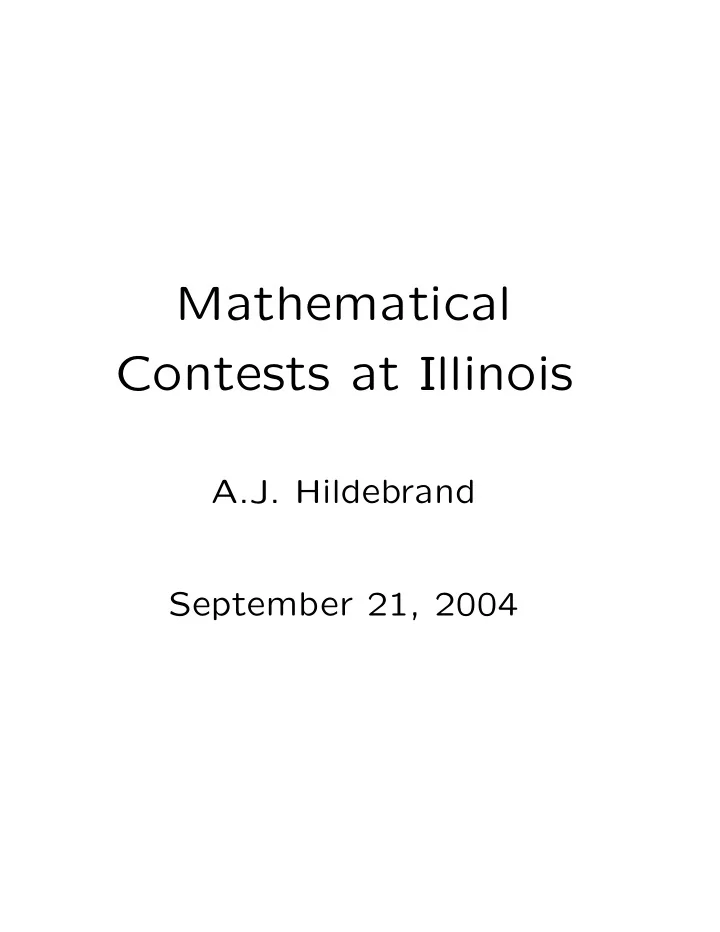

Mathematical Contests at Illinois A.J. Hildebrand September 21, 2004
Math Contest Activities at UIUC: Overview • Putnam contest (December) • Training sessions (Fall) • Practice contests (Fall) • UIUC Undergraduate Math Contest (April) • U of I Putnam Newsletter Subscriptions: ajh@uiuc.edu • UIUC Math Contests Website: http://www. math.uiuc.edu/contests.html 1
The Putnam: Overview • “World’s hardest math contest” (Time Mag- azine, Dec. 23, 2002) • Official name: William Lowell Putnam Math- ematical Competition • Official website: http://math.scu.edu/putnam • Held each year since 1938 • Open to undergraduates in U.S. and Canada • Held first Saturday in December of each year simultaneously at colleges across North America • 3000+ participants in U.S. and Canada • 19 UIUC participants in 2003 2
The Putnam: Details • Prerequisites: Essentially none beyond cal- culus. Most problems require only high school level mathematics. • No calculators, books, notes, etc. • 12 problems, to be solved in 6 hours • Morning and afternoon sessions of 3 hours/6 problems each • Problems arranged by difficulty within each session • Grading: 10 points per problem, 120 points total 3
How hard is is? (Data from 2002) • Maximal score: 120 points • Top three scores (out of 3349): 116, 108, 106 • Median score: 1 point • A score of 60 out of 120 (equivalent to solving half of the 12 problems) was enough to place in the top 2 percent. • A score of 30 points (= 3 correct problems out of 12) was enough to place in the top 10 percent • A score of 11 points (= 1.1 correct prob- lems) was enough to place in the top third 4
Prizes: • $2,500 for Ranks 1–5 • $1,000 for Ranks 6–15 • $250 for Ranks 16–25 • Honorable Mention for next 30–50 5
Team scoring • Each participant works individually (no team work!) • A “Putnam team” consists of three partic- ipants from the same school • The school’s team rank is determined by the sum of the individual ranks of the three team members • The three team members must be named in advanced (by mid October). Rank is determined by the performance of those named to the team, not the top three scor- ers from the school. Thus, a good team performs depends largely on identifying likely top performers on the Putnam early in the semester. 6
Team prizes • $25,000 for first place team • $20,000 for second place team • $15,000 for third place team • $10,000 for fourth place team • $5,000 for fifth place team • Honorable Mention for teams ranked 6–10 7
Top three teams in past 10 years • 2003: MIT, Harvard, Duke • 2002: Harvard, Princeton, Duke • 2001: Harvard, MIT, Duke • 2000: Duke, MIT, Harvard • 1999: Waterloo, Harvard, Duke • 1998: Harvard, MIT, Princeton • 1997: Harvard, Duke, Princeton • 1996: Duke, Princeton, Harvard • 1995: Harvard, Cornell, MIT • 1994: Harvard, Cornell, MIT 8
Top 13 Putnam teams in 2002: 1. Harvard 2. Princeton 3. Duke 4. Berkeley 5. Stanford 6. Harvey Mudd 7. Caltech 8. Waterloo 9. MIT 9
10. Toronto 11. Brandeis 12. Colorado State 13. UIUC 10
Ranked below UIUC Putnam Team in 2002: • All other Big Ten schools • All other Midwestern schools • All public universities except Berkeley and Colorado State • Elite private universities: Univ. of Chicago, Northwestern, ... • Ivy league schools: Brown, Cornell, Yale, Univ. Pennsylvania, ... • Illini football team 11
The UIUC Putnam Team in 2003 • Team Rank: 55th • 4 UIUC students ranked among the top 500: – Wing Ko (212th out of 3615) – Noah Prince (229) – David Klempner (403) – Maria Boca (465) 12
Number of top 500 scorers in 2003 Putnam for Big Ten in- stitutions: • 4 (UIUC) • 3 (Michigan, Penn State, Wisconsin) • 2 (Michigan State, Minnesota) • 1 (Indiana, Iowa, Northwestern, Ohio State) • 0 (Purdue) 13
Number of top 500 scorers in 2003 Putnam for some other institutions: • 69 (MIT) • 45 (Harvard) • 20 (Harvey Mudd College) • 9 (Berkeley) • 2 (UCLA) • 0 (Western Michigan) 14
How to enter the Putnam con- test • Each school must submit a list of its par- ticipants by mid October. • Sign-up sheet (no obligation!) circulated during training sessions. • If you sign up, you are guaranteed a spot. If you haven’t signed up, you can likely to be able to participate anyway, provided there are enough “no-shows” from those who have signed up in advance. (This has always been the case here.) 15
Fall Putnam training sessions • Coaches: A.J. Hildebrand, Denka Kutzorova, Alex Zaharescu • Two levels: Basic (for those new to the contest scene) and advanced (for experi- enced contest takers and those who have participated in the basic sessions in the past). • Tentative schedule: Sessions begin next week (Sept. 28/29). – Advanced sessions: Tuesdays, 5 pm, 141 Altgeld, beginning Sep. 28 – Basic sessions: Wednesdays, 5 pm, 141 Altgeld, beginning Sep. 29 • Sample topics (for basic sessions): Bi- nomial coefficients, inequalities, generating functions, proofs by induction 16
• Very informal, no registration required, no grades, no homework, etc. You can switch from the basic to the advanced session, or vice versa, or attend both. • Sessions are largely independent of each other. • Materials posted on UIUC Math Contest website http://www.math.uiuc.edu/contests. html 17
Practice contests • “Mock Putnam Exams” • Offered during fall semester, biweekly, al- ternating with training sessions, and same place and time • Problems and solutions will be posted on the Math Contests website shortly after the contest. • Problems are similar in nature to Putnam problems, but overall easier. • Practice contests are used, in part, to iden- tify potential Putnam team members (along with other factors, such as past perfor- mance on the Putnam). • Past Mock Putnam Exams: http://www. math.uiuc.edu/~hildebr/putnam/mockputnam. html 18
Recommend
More recommend